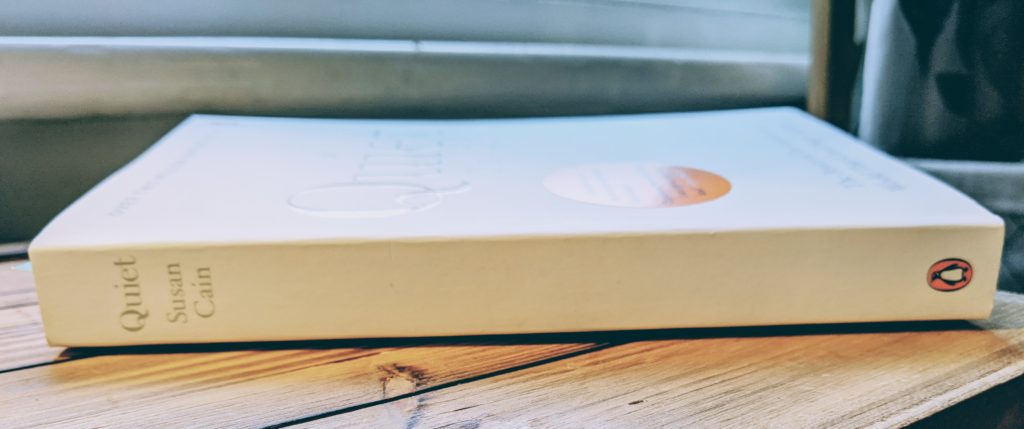 I’m currently reading the book Quiet: The Power of Introverts in a World That Can’t Stop Talking by Susan Cain. It’s a revolutionary book about the power of introverts in a society that seems to only value and promote those who shout the loudest. I’m definitely more of an introvert (perhaps ambivert is more accurate because I have my moments), and although I accept and value my quieter personality (which was suddenly highlighted when I did things in the past like the year of training in youth ministry – “try to be more like Vicky!” – and when learning to teach aerobics – “you need to be louder!”), the book has encouraged me even more to accept my creative, quieter, thoughtful, reflective personality that is sensitive to others and to my environment because it is immensely valuable! Now I know why my primary school teacher chose me to buddy and befriend a nervous new pupil, who I’m still friends with now.
I’m currently reading the book Quiet: The Power of Introverts in a World That Can’t Stop Talking by Susan Cain. It’s a revolutionary book about the power of introverts in a society that seems to only value and promote those who shout the loudest. I’m definitely more of an introvert (perhaps ambivert is more accurate because I have my moments), and although I accept and value my quieter personality (which was suddenly highlighted when I did things in the past like the year of training in youth ministry – “try to be more like Vicky!” – and when learning to teach aerobics – “you need to be louder!”), the book has encouraged me even more to accept my creative, quieter, thoughtful, reflective personality that is sensitive to others and to my environment because it is immensely valuable! Now I know why my primary school teacher chose me to buddy and befriend a nervous new pupil, who I’m still friends with now.
In a particular workplace full of loud people where I was basically overlooked in favour of party girls, I’m actually still in touch with a couple of colleagues over 10 years on, who felt I actually had time for them. When I worked at a London university for 6 months, the managers were really pleased with how I dealt sensitively with the students…and their demanding parents. In the charity HR I work in now, I have found my personality to be a positive thing as we deal with ups, downs, births, deaths, mental health, difficult conversations, confidential info and everything else. And as a Christian, I believe every personality is valuable to God. I mean imagine if everyone was the same, right?
In her book, Susan Cain names loads of introverts who did amazing things and changed the world because of rather than in spite of their personalities, so if you fall somewhere on the introvert scale and have been made to feel like there’s something wrong with that, be encouraged by people like Rosa Parks, Bill Gates, Albert Einstein, Stephen Spielberg, JK Rowling, Mark Zuckerberg (despite how you feel about Facebook LOL), Abraham Lincoln, Gandhi, Charles Darwin, Barack Obama, plus many, many dancers, comedians, musicians, actors, singers…there are so many people, I don’t have space to list them all 🙂
Anyway, the main reason I mention this book is that one of the chapters talks about the concept of ‘Deliberate Practice’, which immediately caught my attention. The author references a study into 3 groups of violinists at an elite music school in Berlin – the best, the good and those who only wish to teach – but I was interested in relation to tap dance. Deliberate Practice is described as “serious study alone” and the “key to exceptional achievement”. In other words, if you want to be an amazing tap dancer, you’ve got to practise on your own…a lot. (The lowest group of violinists put in 1.3 solitary hours a day, whereas the top-level violinists put in 3.5 solitary hours a day and regarded group practice as leisure).
A few of the guests we had on the ‘Tap & Tea’ history talks last year posed the question ‘how much class is too much class?‘ – i.e. you can take all the tap classes going but still not show any improvement because you’re not taking the time to put the work in on your own. I know my real improvements in tap came when I actually spent the time in my garage studio, in front of the mirror going over and over things until I got them…and then refined and cleaned them up. (It’s not that I spent 3.5 hours shedding wood in one go, but even the 40 minutes spent on a Saturday afternoon make a massive difference in what I bring to my next class).
“When you practice deliberately, you identify the tasks…just out of your reach…,strive to upgrade your performance, monitor your progress and revise accordingly” Quiet, pg81
Have you read the book? Are you an introvert? What do you think about ‘Deliberate Practice’ in relation to tap, or perhaps other styles of dance? Let me know in the comments 🙂
 Lately, I’ve found myself having conversations encouraging some of my classmates to practise outside of class. Before class people tend to ask each other if they’ve practised the routine, and I find some people are saying they don’t practise and they’re shocked at how much I do (and I really don’t do that much compared to some tap dancers). Now I know I am obsessed with tap, and want to get to a higher skill level, so I do try to practise the class routine at least 3 different days a week (not particularly long sessions), otherwise I find it doesn’t get into my muscle memory… and that’s a separate thing to doing drills etc, which I try to do on weekends, but I haven’t managed much of that since the autumn. I also know some people just want to do tap dance for fun and not really have to do homework – I definitely get that…BUT THEN they get frustrated in the class and sometimes even with the teacher. A lady recently told me she’s been doing tap classes on and off for about 20 years now, and she’s not improving, so her solution was perhaps to enrol in more classes. I asked her how much she practises outside of class – she doesn’t really. AHA. Imagine if we were talking about learning a musical instrument – I’m not improving but I don’t practise outside of my lessons. Unfortunately, it won’t happen by OSMOSIS 🙂
Lately, I’ve found myself having conversations encouraging some of my classmates to practise outside of class. Before class people tend to ask each other if they’ve practised the routine, and I find some people are saying they don’t practise and they’re shocked at how much I do (and I really don’t do that much compared to some tap dancers). Now I know I am obsessed with tap, and want to get to a higher skill level, so I do try to practise the class routine at least 3 different days a week (not particularly long sessions), otherwise I find it doesn’t get into my muscle memory… and that’s a separate thing to doing drills etc, which I try to do on weekends, but I haven’t managed much of that since the autumn. I also know some people just want to do tap dance for fun and not really have to do homework – I definitely get that…BUT THEN they get frustrated in the class and sometimes even with the teacher. A lady recently told me she’s been doing tap classes on and off for about 20 years now, and she’s not improving, so her solution was perhaps to enrol in more classes. I asked her how much she practises outside of class – she doesn’t really. AHA. Imagine if we were talking about learning a musical instrument – I’m not improving but I don’t practise outside of my lessons. Unfortunately, it won’t happen by OSMOSIS 🙂
 I’m currently reading the book Quiet: The Power of Introverts in a World That Can’t Stop Talking by Susan Cain. It’s a revolutionary book about the power of introverts in a society that seems to only value and promote those who shout the loudest. I’m definitely more of an introvert (perhaps ambivert is more accurate because I have my moments), and although I accept and value my quieter personality (which was suddenly highlighted when I did things in the past like the year of training in youth ministry – “try to be more like Vicky!” – and when learning to teach aerobics – “you need to be louder!”), the book has encouraged me even more to accept my creative, quieter, thoughtful, reflective personality that is sensitive to others and to my environment because it is immensely valuable! Now I know why my primary school teacher chose me to buddy and befriend a nervous new pupil, who I’m still friends with now.
I’m currently reading the book Quiet: The Power of Introverts in a World That Can’t Stop Talking by Susan Cain. It’s a revolutionary book about the power of introverts in a society that seems to only value and promote those who shout the loudest. I’m definitely more of an introvert (perhaps ambivert is more accurate because I have my moments), and although I accept and value my quieter personality (which was suddenly highlighted when I did things in the past like the year of training in youth ministry – “try to be more like Vicky!” – and when learning to teach aerobics – “you need to be louder!”), the book has encouraged me even more to accept my creative, quieter, thoughtful, reflective personality that is sensitive to others and to my environment because it is immensely valuable! Now I know why my primary school teacher chose me to buddy and befriend a nervous new pupil, who I’m still friends with now.